Men waste thousands of dollars on bunk dietary supplements that claim to “increase testosterone by 500% in just one week!” or on trying fake fad diets that some ripped celebrity swears by.
Consider that if anything actually increased testosterone or burned fat so rapidly and exponentially, it wouldn’t be sold over the counter.
You should always approach supplement claims with a sense of skepticism. If it’s too good to be true, it usually is. Take it from someone who has spent upwards of a decade researching and writing about supplements for men (and using them myself), many of them don’t do much.

But it’s also not accurate to say that all supplements are bogus. Quite the opposite, actually. There are plenty of important supplements that men should consider adding to their supplement stash.
Table of Contents
List of the 20 Most Important Supplements for Men
The following list, in no particular order, breaks down the science and rationale behind the 20 most important supplements for men:
Magnesium
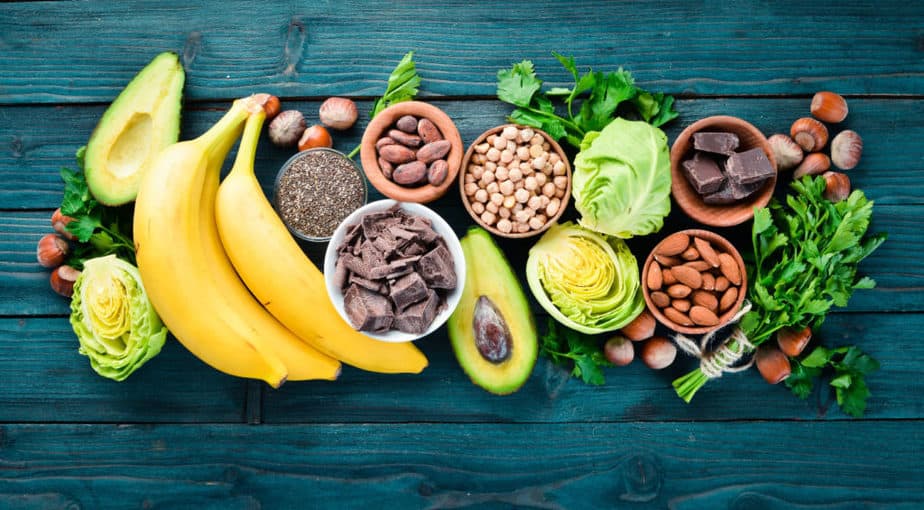
Magnesium is an essential dietary mineral and a ubiquitous element in nature. Being a cofactor (“assisting molecule”) for a plethora of biological processes, magnesium is suggested to play a vital role in virtually every bodily system, especially the nervous, muscular, and endocrine systems.
A recent four-week study even found that daily magnesium supplementation increased both free and total testosterone levels in sedentary individuals and athletes. The kicker is that the athletes saw the greatest increases, confirming the importance of regular exercise for men looking to boost testosterone naturally.
Normally, magnesium is abundant in plant foods like leafy greens, various nuts, and legumes. However, recent research has found that the magnesium content of food sources is declining at an alarming rate (ostensibly because of modern agricultural practices). Consequently, a population-level decline in magnesium status has also been observed over the last decade.
As such, supplementing with a bioavailable form of organic magnesium, such as magnesium citrate or chelated magnesium, is generally a wise decision even if you follow a plant-based diet. Avoid magnesium supplements with magnesium oxide, as this form is poorly absorbed and won’t do much for your well-being.
On that note, check out our Guide to great Magnesium Supplements!
Zinc
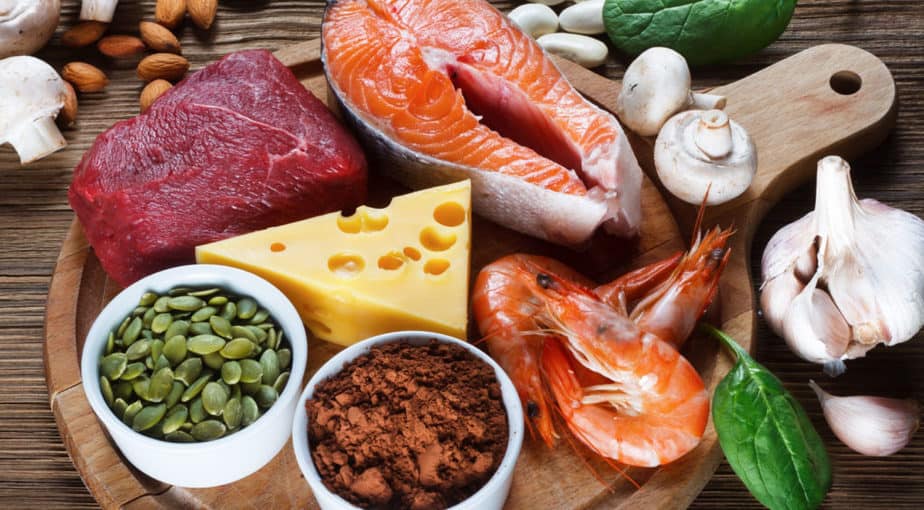
Zinc is another crucial dietary mineral that regulates myriad vital functions, including immunity, reproduction, and hormone production.
In addition, zinc plays a particularly important role in supporting healthy testosterone levels and sperm cell counts in active men. Multiple studies in athletes and aging men have found that supplementing with zinc significantly increases bioavailable testosterone and fertility.
Additionally, zinc is suggested to increase the conversion of androstenedione, an androgen precursor, to testosterone. It also inhibits the breakdown of testosterone to dihydrotestosterone (DHT) by the liver enzyme 5-alpha-reductase, which may benefit prostate health.
Zinc supplements come in many forms, the most effective of which include zinc picolinate, zinc gluconate, zinc citrate, and zinc glycinate. For boosting testosterone and encouraging healthy immune function, shoot for 50 to 100 milligrams of elemental zinc per day taken roughly 30 minutes before bedtime on an empty stomach.
Vitamin D3
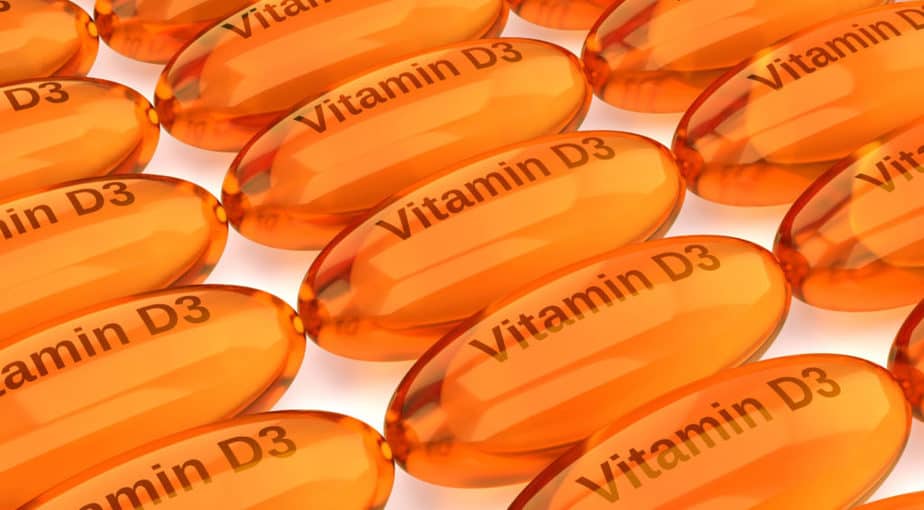
The ultraviolet rays of the sun are Mother Nature’s way of activating pre-vitamin D3 found in the skin, subsequently converting it to vitamin D3, the primary storage form of vitamin D in the human body. Vitamin D is crucial for myriad physiological processes — notably mood regulation and sex hormone production. In fact, men with higher vitamin D levels typically have higher testosterone levels and vice versa.
The plight many of us face is being stuck inside all day behind a computer. Heck, I’m sitting inside typing away right now. But it behooves any man (or woman, for that matter) to get a solid dose of sunshine as often as possible.
Even 20 to 30 minutes of daily direct sunlight exposure can have profound effects on mood, emotional well-being, stress, and testosterone levels. Supplementing with 500 to 2000 IU of vitamin D3 per day may provide similar benefits, but the evidence remains inconclusive so don’t do this in lieu of regular sunlight exposure.
If you work at an indoor job, go outside for your breaks or during lunch. If you can’t do that, get out for a walk before or after work while the sun is up. Of course, an occasional cloudy day means you won’t be getting much sun but that’s fine — more incentive for you to take advantage of the sunny days when they come around. Never take a breath of fresh air for granted.
Fish Oil & Omega-3 Fatty Acids
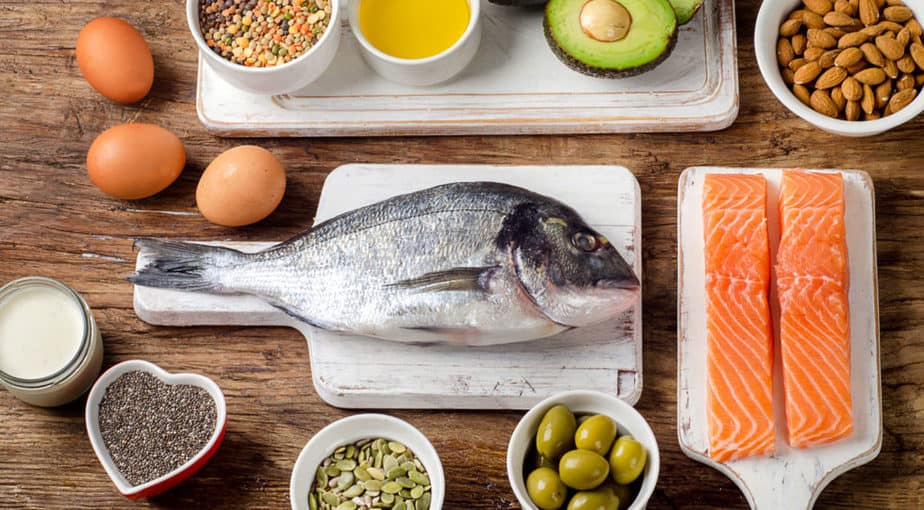
Fish oil supplements are a dime a dozen these days, and most people who take a fish oil supplement just buy the cheapest bottle they can find at the local supermarket. This is an utter waste of your hard-earned money. These low-quality fish oil supplements may claim to provide “1,500 milligrams of omega-3s per serving,” but if you look closer at the nutrition facts, only a small portion of those omega-3s are EPA (eicosapentaenoic acid) and DHA (docosahexaenoic acid) — the critical omega-3s essential fatty acids.
A third shorter-chain omega-3 fatty acid called alpha-linolenic acid (ALA) is generally the major component of cheap fish oil supplements. However, the health benefits of ALA aren’t commensurate with those of EPA and DHA.
You’re much better off spending a little extra for a highly concentrated fish oil supplement that’s rich in EPA and DHA since these are the key omega-3 fatty acids that protect the heart, brain, skin, and other vital organs.
After continuous use of fish oil supplements, EPA and DHA become enriched with blood lipids and make their way into cell membranes, thereby influencing many aspects of wellness and modulating things like inflammation and oxidative stress.
While EPA and DHA are abundant in fatty freshwater fish, such as salmon and mackerel, there’s increasing concern over the risk of heavy metal toxicity when eating these foods regularly due to rising pollution in large bodies of water. Thus, supplementing with fish oil is a practical way to increase the amount of EPA and DHA in your diet while limiting the intake of noxious chemicals like arsenic, mercury, and lead.
Vegans and those who follow plant-based diets tend to consume large amounts of ALA but not enough EPA or DHA. The body can convert ALA into EPA and DHA, but the extent of this conversion is trivial. Thankfully, there are vegan-friendly omega-3 supplements that provide plant-based EPA and DHA, typically from microalgae.
For health and longevity, men should aim for a combined 2,000 to 3,000 milligrams of EPA and DHA per day, ideally in a 3:1 or 2:1 ratio of EPA to DHA.
Whey Protein

Protein is the most important macronutrient for men who want to pack on muscle mass and get lean. Aside from the multitude of functions proteins play throughout the human body, they are the major constituent of skeletal muscle tissue. Naturally, putting in countless hours pumping iron at the gym won’t do much good if you’re not eating enough high-quality protein.
Research makes it clear that the protein needs of active individuals, especially those who lift weights regularly, are quite a bit higher than the recommended daily allowance (RDA) for protein (which is a mere 0.36 grams/pounds body weight). If you’re an active male trying to build muscle, you should be eating at least 0.7 to 0.8 grams protein/pounds body weight on a daily basis.
Some data suggest daily protein intakes as high as 1.2 to 1.4 grams/pounds body weight are beneficial for those who train intensely and frequently.
To meet these greater protein demands, supplement your diet with a quality whey protein powder. Not only is whey protein a complete protein source with all the necessary essential amino acids to support muscle growth, it’s also rapidly absorbed and has exceptional biological value compared to other protein sources.
Choline
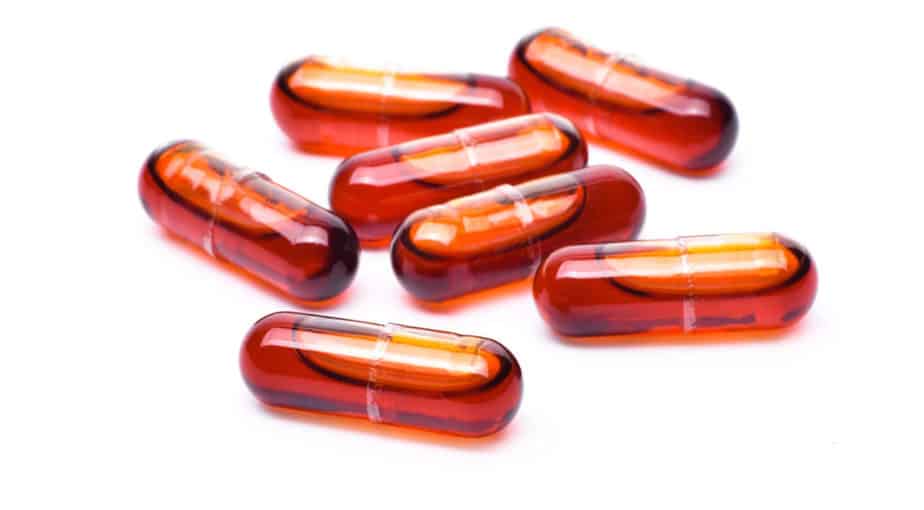
Choline is a commonly overlooked B vitamin that plays an essential role in cell membrane phospholipids and throughout the nervous system. The body requires choline for synthesizing the neurotransmitter acetylcholine, the most important chemical messenger for cognitive tasks like memory recall and learning comprehension. Naturally, we become more forgetful as we grow older due to the loss of acetylcholine transmission, and this can lead to things like Alzheimer’s disease and cognitive dysfunction.
But new research suggests that supplementing with highly bioavailable forms of choline, specifically alpha-glycerylphosphorylcholine (alpha-GPC) and citicoline (CDP-choline), is an effective way to protect acetylcholine transmission from age-related neurodegeneration and even stimulate the growth of new nerve cells in the brain. Quite simply, choline can help keep your mind sharp and perceptive for years to come.
When buying a choline supplement, it’s imperative to look for a formula with alpha-GPC or citicoline instead of choline bitartrate. Only a fraction, if any, of the choline in choline bitartrate reaches the bloodstream, whereas alpha-GPC and citicoline are well-absorbed.
B Vitamins
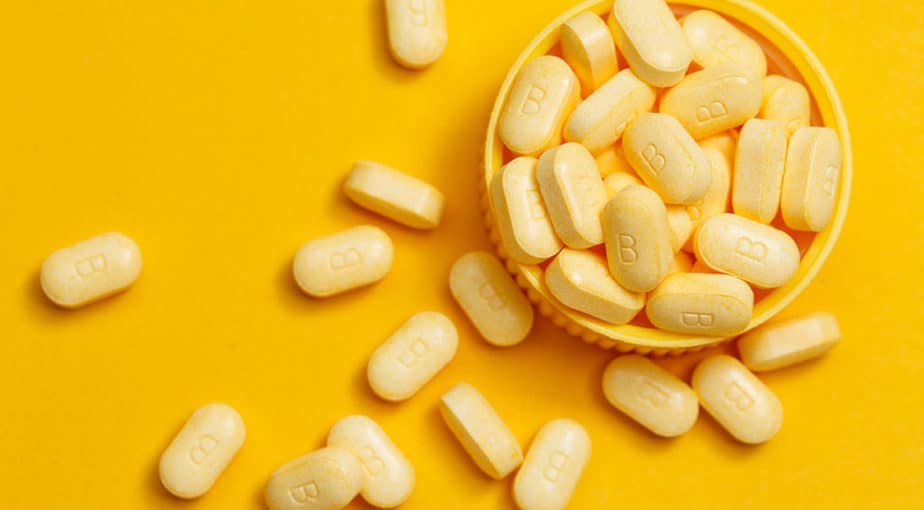
The B vitamins collectively make up the most diverse group of vitamins, all of which are essential for human health and longevity. What makes B vitamins so crucial for men is that they serve as precursors to many metabolic co-factors in the body, such as nicotinamide adenine dinucleotide (NAD+), coenzyme A, and thiamine pyrophosphate.
Without B vitamins and their eventual cofactors, even basic biological functions such as converting glucose from food into cellular energy — ATP (adenosine triphosphate) — wouldn’t be able to occur at the necessary rate for survival.
B vitamins may also directly act as coenzymes in various physiological reactions, especially for things like DNA synthesis, nutrient metabolism, and red blood cell maturation. In layman’s terms, think of B vitamins like “helper molecules” that allow your cells to fully harness the energetic and anabolic potential of macromolecules like carbohydrates and proteins.
Look for a B vitamin complex or men’s multivitamin supplement that provides the basic B vitamins in their most bioavailable forms:
- Vitamin B1 (as Benfotiamine)
- Vitamin B2 (as Riboflavin)
- Vitamin B3 (as Nicotinic Acid)
- Vitamin B5 (as Calcium Pantothenate)
- Vitamin B6 (as Pyridoxal-5’-Phosphate)
- Vitamin B7 (as d-Biotin USP)
- Vitamin B9 (as L-5-Methyltetrahydrofolate/MTHF)
- Vitamin B12 (as Methylcobalamin)
Electrolyte Complex (Salt, Potassium; Many Men Are Deficient)

Electrolyte supplements are another worthwhile addition to a man’s supplement stash, especially those men who are active and hit the gym regularly. Traditionally, gym-goers and athletes will slam a “sports beverage” that contains copious amounts of added sugar during exercise. These drinks claim to help replenish electrolytes lost through sweat, such as sodium and potassium, but they more so work by helping people retain fluid and replenishing glycogen, the storage form of carbohydrates in body tissues.
Since glycogen pulls water into cells, drinking a sugary beverage is useful for hydration; however, this typically causes a spike in blood glucose, which can lead to energy swings.
Thankfully, there are many sugar-free electrolyte powder supplements on the market these days, many of which are refreshing to drink and easy to add to water. Using an electrolyte supplement can help ensure you get ample amounts of essential minerals like potassium, magnesium, calcium, phosphorus, and sodium.
Melatonin
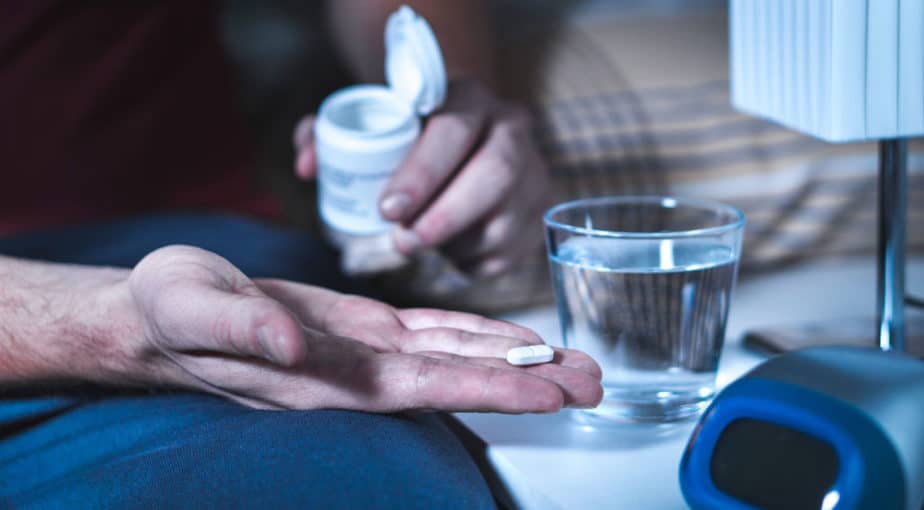
Given the way many people work themselves around the clock and barely find the time to breathe, sleep deprivation is extremely common nowadays. Make no mistake, a lack of sleep will eventually slow you down, if not cut your life short altogether.
Melatonin is the veritable “sleep hormone” that is naturally produced by the pineal gland when the sun goes down. As a metabolite of serotonin, melatonin regulates the body’s circadian clock, telling us it’s time to go to sleep when it’s dark outside. This is one reason why shift workers frequently struggle with sleep and health issues, as humans are not biologically programmed to sleep when the sun is out and stay awake all night.
Taking a melatonin supplement works by providing a rapid supply of melatonin, which can be especially useful if you’re someone who travels a lot (for fighting jet lag), works odd hours, or struggles to fall (and stay) asleep at night. You can generally find melatonin supplements at most supermarkets and local pharmacies. Sublingual and liposomal melatonin supplements tend to be faster-acting and less likely to cause day-after drowsiness than capsules/tablets.
Creatine Monohydrate
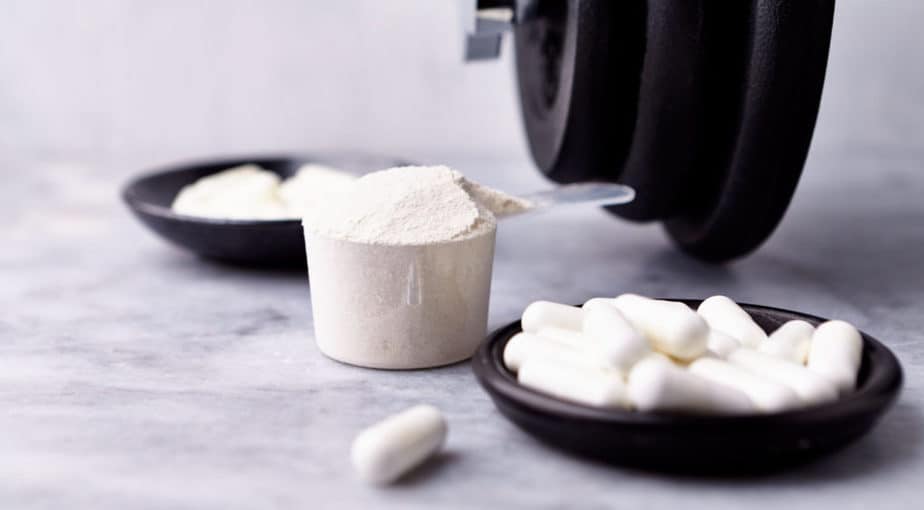
Creatine monohydrate is the undisputed champion of sports supplements. Hundreds of studies show that taking a creatine monohydrate supplement can significantly enhance both aerobic and anaerobic exercise performance, resulting in greater muscle growth, quicker recovery, and numerous other benefits.
The average 200-lb man’s body contains approximately 150 g of creatine (as creatine and phosphocreatine), most of which resides in skeletal muscle tissue. In sedentary individuals, the body breaks down about 1%-2% of its creatine pool per day; gym-goers and athletes, however, may exhaust as much as 5% of creatine stores on a daily basis.
The body replenishes small amounts of creatine via the amino acids arginine, glycine and methionine. There are also foods that contain creatine (red meat typically contains modest amounts of creatine). Though, obtaining enough creatine for performance benefits solely from diet and endogenous amino acid synthesis is rather impractical, especially for men who are looking to build muscle and perform better in the gym.
Thus, creatine monohydrate should be a staple in any active man’s supplement stash.
Daily Vitamin
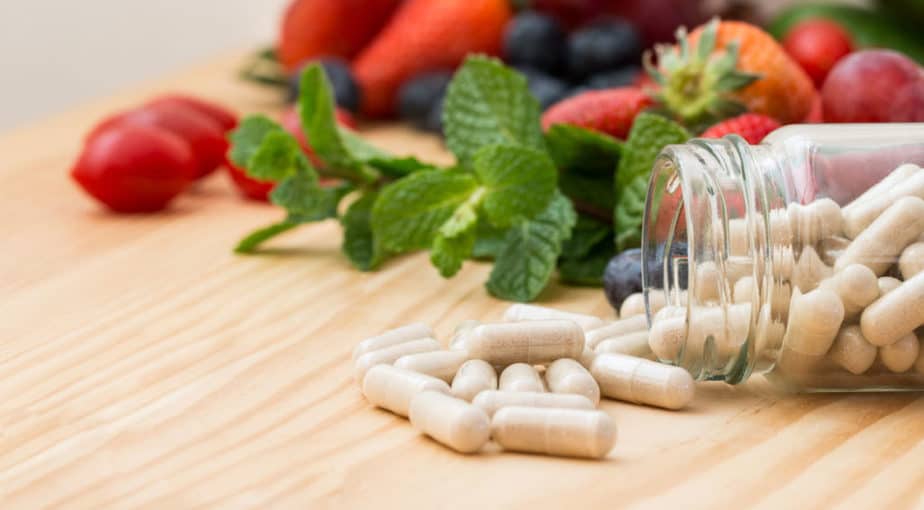
Despite only requiring a relatively small amount of them, micronutrients (e.g. vitamins and minerals) are vital to our health, longevity, and performance. Yet, micronutrients remain one of the most overlooked aspects of the human diet.
So, should you take a daily vitamin supplement?
Considering that most people have a tough time meeting their micronutrient needs through vitamin- and mineral-rich food sources, such as fruits and vegetables, a daily vitamin supplement can help men avoid deficiencies.
Now, let’s be clear that taking a multivitamin is not a replacement for eating a healthy, balanced diet. You should first and foremost focus on eating plenty of nutrient-dense vegetables and fruits. Using a daily vitamin supplement will serve as an “insurance plan” of sorts to help you meet your daily vitamin and mineral needs.
With that in mind, be sure to check out our list of the top multivitamins for men.
Probiotics
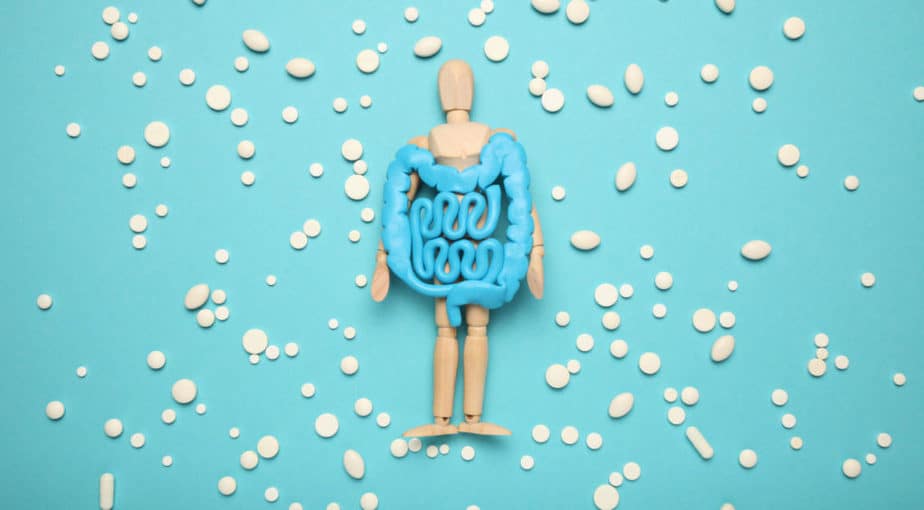
Probiotics are taking the supplement industry by storm, and for good reason. The gut microbiome — home to upwards of 1,000 different microbial species — is the quintessential “second brain” of the human body.
Probiotics are supplements that work by delivering “friendly” bacteria (and occasionally yeast) to the lower gastrointestinal tract. In turn, these microbes can interact with human intestinal cells through several mechanisms, notably by fermenting indigestible nutrients such as dietary fiber into short-chain fatty acids (e.g. butyric acid and propionic acid).
Research has found that probiotics, especially Lactobacilli and Bifidobacteria, can positively affect hormonal signaling, immune function, and even fat loss by modulating the composition of gut microbiota.
For example, one study found that the bacterial species Lactobacillus farciminis diminishes the cortisol spike in response to stressful situations. Other research suggests that Lactobacillus reuteri helps reduce inflammation.
On the flipside, harmful microbes in the gut can increase oxidative stress and inflammation by producing chemicals that attack molecules such as DNA and proteins. Over time, this can damage vital organs and lead to chronic health conditions. The catch is that these “unfriendly” gut bacteria thrive on simple sugars — yet another reason to lay off the junk food.
Choosing a proper probiotic supplement can be quite tricky due to the immense diversity of product formulas. Follow our Guide to Buying Probiotics for help picking the right one.
Healthy Cooking Oils (Avocado, Olive, Macadamia Nut, Coconut)
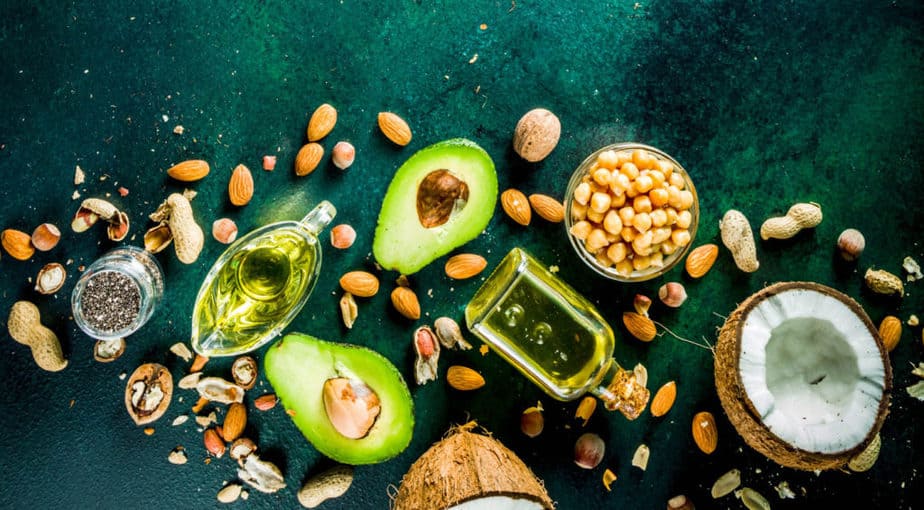
Many vegetable cooking oils (e.g., canola oil, soybean oil, peanut oil, and corn oil) are rich in proinflammatory linoleic acid, and omega-6 polyunsaturated essential fatty acid. You might think, “It’s unsaturated fat; that’s good for me, right?”
Well, not necessarily.
Scientists contend that the rise of inflammatory diseases is a corollary of Western diets being replete with processed foods that are high in linoleic acid and lacking in monounsaturated fats, as well as anti-inflammatory omega-3s like EPA and DHA (which we discussed earlier).
As a real-world example, why is it that Italy and other Mediterranean countries have such lower incidences of cardiovascular disease than the U.S.? They rarely use cheap cooking oils and processed fats when making food. Instead, they get their fats from foods like olive oil and grass-fed beef.
The takeaway is to limit your consumption of processed vegetable oils and foods containing these ingredients (like most salad dressings). Opt for cooking with olive oil, avocado oil, macadamia nut oil, or coconut oil. These are all rich in healthy essential fatty acids that are scarce in Western diets.
L-Citrulline

Curious why some men claim that slamming a watermelon smoothie is like “natural Viagra”?
In a word: L-citrulline.
Citrulline is an alpha amino acid found in the rind and flesh of watermelons. In fact, citrullus is the Latin word for watermelon, from which this amino acid derives its name. Contrary to most dietary amino acids, L-citrulline is not used for protein synthesis. Instead, it serves as a precursor to L-arginine, and therefore, nitric oxide (NO).
Several recent studies show that L-citrulline is a promising supplement for men due to its potent vasodilating actions. In layman’s terms, this translates to better blood pressure control, stronger erections, and healthier cardiovascular function.
For athletic performance, take 4,000 to 6,000 milligrams of L-citrulline about 30 minutes before exercise. For general cardiovascular health and supporting erectile function, 1,500 to 2,000 milligrams per day should do the trick.
L-Glycine

Glycine is a conditionally essential amino acid in humans that plays myriad roles in cellular physiology and has quite a few beneficial effects on cardiometabolic and neurological function. For example, glycine is a crucial precursor to vital biological molecules, notably collagen, creatine, glutathione, and heme (in hemoglobin).
As such, a glycine supplement can help with things such as skin health, calmness, cellular hydration, blood pressure, and antioxidant status/toxin elimination.
Multiple clinical trials also support the use of glycine as a natural sleep aid, even in relatively modest 1,000-milligram doses about an hour before bedtime. Evidence suggests that glycine mediates the effects of NMDA (glutamate) receptors within the hypothalamus in the brain, thereby regulating the body’s innate circadian clock.
DIM (Diindolylmethane)

Before we discuss diindolylmethane (DIM), let’s clear up some misconceptions about the role of estrogen in men. “Estrogen” refers collectively to the principle female sex hormones: estradiol, estrone, and estriol. This group of steroids is largely responsible for the development of feminine secondary sex characteristics.
Hence, it’s common for men to assume that estrogen is outright “bad” for their health and longevity, but that’s not necessarily true. Just as females need small amounts of androgens (e.g. testosterone) for proper health, males need small amounts of estrogen.
However, men with high estrogen often experience symptoms similar to those of low testosterone. Excess estrogen can lower testosterone levels in men by curtailing androgen receptor activity and reducing the synthesis of gonadotropin-releasing hormone.
This is where a DIM supplement can help. DIM is a metabolite derived from cruciferous vegetables (e.g., broccoli, cauliflower, cabbage).
Research has found that DIM acts as both a “selective estrogen receptor modulator” (SERM) and “selective androgen receptor modulator” (SARM) that can help control estrogen balance in both men and women. DIM also appears to inhibit the proliferation of prostate cancer cell lines and activate liver enzymes that expedite the clearance of estrogen metabolites.
As a general male wellness supplement, DIM shouldn’t be overlooked.
Ashwagandha (Lowers Stress, Calms, Helps with Sleep)
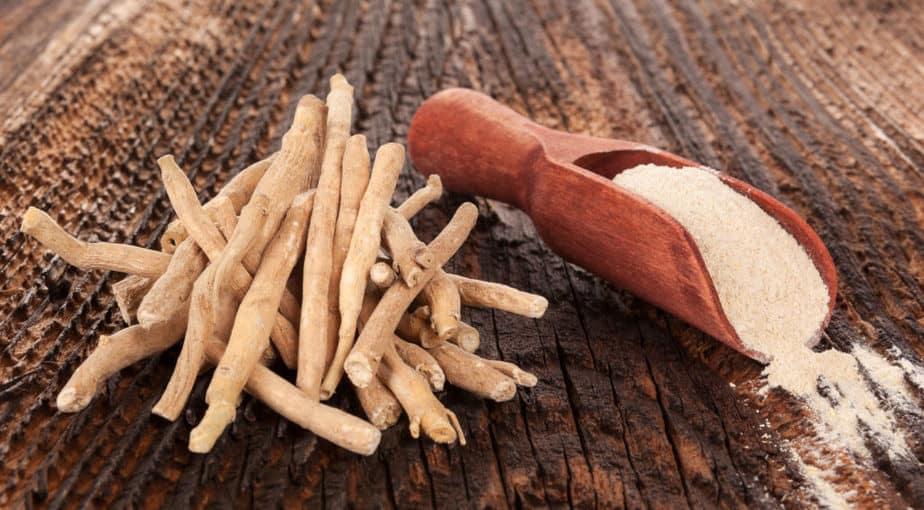
Ashwagandha (Withania somnifera) is a small fruit-bearing nightshade plant, native to the Middle East and African regions, that has been used in ayurvedic practices for centuries to boost the immune system.
Ashwaganhda has quickly become the paragon of “adaptogenic herbs” due to its versatile stress-relieving and calming properties. (“Adaptogenic” is a term used to refer to herbs that help us “adapt” to stress and restore homeostasis.)
The roots and leaves of ashwagandha contain a range of therapeutic compounds, such as alkaloids, saponins, and steroidal lactones (withanolides). Withaferin-A, the first known withanolide isolated from the roots of ashwagandha, has been shown to have anti-inflammatory, antidepressant, anti-hypertensive, antioxidant, and immune-supporting properties in humans.
Even better for men, several clinical studies suggest that ashwagandha can boost testosterone significantly and increase fertility.
The mechanisms behind how the bioactive constituents of ashwagandha exert such multifarious benefits are quite complex on a molecular level. To put it simply, withanolides like withaferin-A work by increasing or decreasing the activity of certain proteins and enzymes in cells in an effort to maintain homeostasis. Hence, ashwagandha helps us “adapt” to stressors.
When buying an ashwagandha supplement, look for one that contains Sensoril® Ashwagandha or KSM-66® Ashwagandha. These are the gold standard extracts of ashwagandha that guarantee a consistency potency.
Iodine

In nature, most iodine comes in the form of iodide salts, especially in seaweed/kelp. Iodine is a trace mineral that is necessary for thyroid hormone synthesis and protecting the thyroid gland from oxidative stress. In fact, thyroid cells are the only cells in the human body that are capable of utilizing iodine.
Iodine deficiency is well known to impair thyroid function and increase the risk of thyroid disease. Symptoms of thyroid dysfunction and iodine deficiency typically include lack of energy, lethargy, low body temperature, and compromised immunity.
Supplementing with iodine (or kelp/seaweed) can help avoid deficiency of this key trace mineral and support the thyroid gland as well as other iodine-dependent processes.
NAC (N-Acetylcysteine)
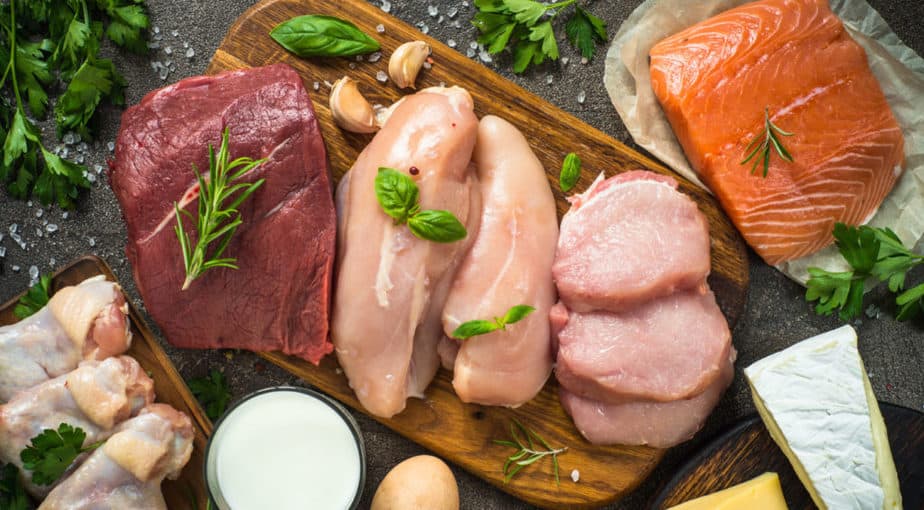
L-cysteine is a sulfur-containing amino acid that is conditionally essential, meaning the body’s demand for it increases during times of stress.
In contrast to other conditionally essential amino acids, like L-glutamine, L-cysteine is generally not abundant in the typical Western diet. Not consuming enough cysteine is problematic since it’s a biological precursor of glutathione, a crucial endogenous antioxidant that helps neutralize free radicals throughout the body.
Thus, L-cysteine/glutathione deficiency can significantly reduce the body’s antioxidant capacity and increase the risk of chronic oxidative stress, the latter of which is presumably the cause of numerous modern diseases.
Thankfully, you can get more L-cysteine in your diet by supplementing with the modified form of this amino acid, called N-acetylcysteine or “NAC.” Compared to plain L-cysteine, NAC has the advantage of surviving first-pass metabolism in the liver, leading to better absorption and rapid increases in glutathione levels.
Nootropics and Mood Boosters including Taurine, Theobromine, L-Tyrosine, etc
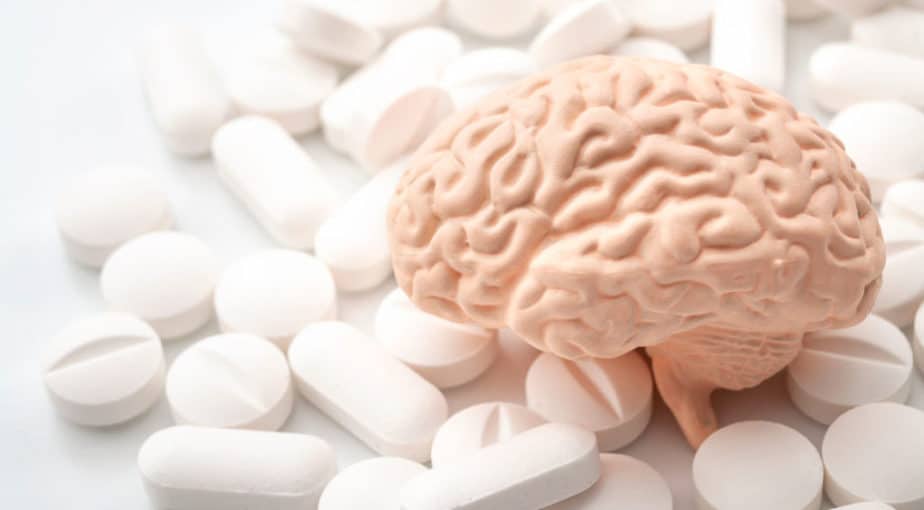
Last, but not least, on our list of the top 20 supplements for men are nootropics and mood boosters. “Nootropic” is an umbrella term of sorts that applies to supplement ingredients that are thought to promote cognitive function, mental acuity, healthy mood, neuroregenerative processes, and fight stress/anxiety.
More simply, nootropics are supplements that nourish the brain. Chances are you’re familiar with nootropics like taurine, L-tyrosine, and L-theanine. These ingredients typically work by modulating neurotransmitter activity and suppressing neurodegenerative processes.
Other nootropic ingredients, like coffeeberry extract, appear to increase the dendritic arborization and myelination of neurons (basically a nerdy way of saying it helps your brain cells form new synapses and transmit messages more efficiently).
The main thing to watch for when using a nootropic supplement or mood booster is whether or not it contains stimulants. For example, caffeine and its metabolite theobromine are central nervous system (CNS) stimulants with pronounced nootropic effects. However, these are also likely to make you feel more “on edge” than calm you down.
Caffeine and theobromine certainly have their place in a nootropic formula, but if you want something to help unwind and relax in the evening, opt for a stimulant-free nootropic.
Best Supplements for Men: Takeaway

Phew, that was quite a bit to digest, but you made it! Hopefully, this list of the 20 most important supplements for men can guide your future supplement shopping sprees.
Now, it would be remiss not to mention that supplements are meant to supplement a healthy lifestyle, exercise routine, and proper diet. Supplements only work if you put in the effort, whether it’s in the kitchen, the gym, or with lifestyle choices. Think of them as positive health and performance “exponents.” They can take your results up a notch, but raising zero (effort) to any positive exponent is still zero.
Before you invest tons of money in supplements, invest in quality foods, a gym membership, and other healthy-living necessities. More often than not, men overlook the daily habits that detract from their health goals, like skimping on sleep, sitting inside all day, and drinking alcohol like another Prohibition era is looming around the corner. As awesome as supplements can be, they won’t make up for unhealthy habits.
